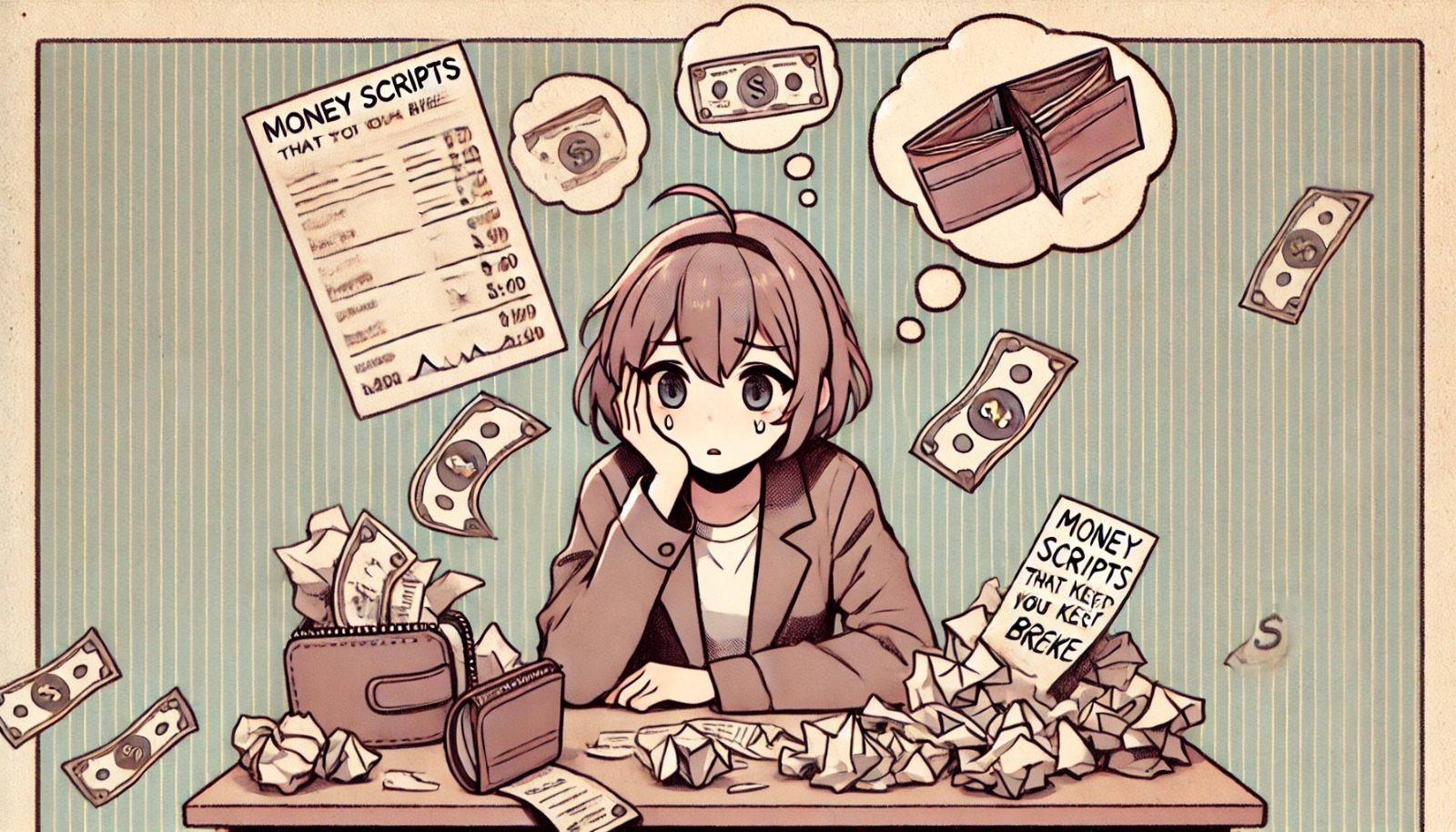5 Money Scripts That Keep You Broke
Money scripts are unconscious beliefs we have about money. Think of them like little stories or rules that got programmed into our brains when we were young. We don’t even realize they’re there, but they constantly influence how we earn, spend, save, and feel about every dollar.
So, I wanted to share some common ones I’ve learned about. Seeing them is the first step to taking back control and writing a better money story for yourself.
Why Your Money Mindset Matters More Than You Think
We spend so much time trying to learn how to make money, how to budget, or researching strategies for things like effective debt management. Still, we rarely talk about the invisible beliefs steering our financial ship.
If your underlying beliefs about money are working against you, all the best spreadsheets and economic plans might not make a dent. It’s like trying to drive a car with one foot on the gas and the other slamming the brakes.
Understanding these scripts is like getting the user manual for your brain’s financial operating system. Once you see the “code,” you can debug it.
1. The “Money is the Root of All Evil Script
Maybe you grew up hearing negative comments about wealthy individuals or saw countless movies in which the rich guy was the villain. Sometimes, it’s a belief system that helps people feel okay about not having much money.
If deep down you believe money is inherently bad, your brain will cleverly make sure you don’t have too much of it. It can show up as:
- Underearning on purpose: You might shy away from asking for that raise you deserve, constantly underprice your services if you’re self-employed, or avoid career paths that could be lucrative because “too much” money feels uncomfortable or wrong.
- Financial self-sabotage: When a windfall does come your way, you might find yourself getting rid of it quickly. Impulsive spending sprees, lending it to unreliable friends, or making risky investments can all be ways your subconscious tries to offload that “tainted” cash.
- Feeling guilty when you do succeed: If you start earning well or building some wealth, instead of feeling proud, you might feel anxious, ashamed, or like an impostor.
Money itself isn’t good or bad. It’s just a tool. The morality comes from how you earn it and what you choose to do with it.
- Reframe “wealth”: Think of money as a resource that can empower you to do good things – support your family comfortably, contribute to causes you believe in, create opportunities for yourself and others, or simply live with less financial stress.
- Own your value: You deserve to be compensated fairly for your skills, time, and the value you bring to the world. Earning a good living doesn’t make you a bad person; it often means you provide significant value.
- Shift to an abundance mindset: The idea that there’s a limited pie of money, and your gain must be someone else’s loss, is often a myth. Value can be created, and wealth can be generated ethically.
2. The “More Money Will Magically Fix Everything” Script
We live in a world that shouts this message at us from every billboard, TV ad, and social media feed. The connection between wealth and the “perfect, happy life” is constantly reinforced.
This script is like chasing a carrot on a stick that’s always out of reach.
- The workaholic trap: You might burn yourself out, sacrificing your health, relationships, and general well-being in the relentless pursuit of more money, believing it’s the golden ticket.
- The “is that all there is?” feeling: Even when you hit a financial milestone you thought would bring bliss, the happiness is often short-lived. Why? Because money alone can’t fix deeper human needs like purpose, connection, or self-acceptance.
- Retail therapy gone wild: If you equate money with happiness, you might spend impulsively to get that quick mood boost, which can easily lead to a cycle of buyer’s remorse and debt.
Money can make life more comfortable and reduce certain kinds of stress. No doubt. But it’s not a magic happiness pill.
- Dig for your real values: What truly makes you feel joyful and fulfilled? Meaningful connections? New experiences? Learning something new? Your physical health? Creativity? Money can support these, but it can’t be them.
- Practice a little gratitude: It sounds cheesy, but consciously focusing on what you already have–big or small–can shift your perspective from “never enough” to “already abundant in many ways.”
- Set goals beyond the dollar signs: What do you want to achieve in your relationships, your health, your personal growth, your community involvement? These are often the things that bring lasting satisfaction.
3. The “Gotta Look Successful to Be Successful” Script
We see curated highlight reels and often feel pressure to “keep up with the Joneses” (or the Kardashians, or that influencer who seems to have it all).
This script is a one-way ticket to Financial Stressville, often with a first-class seat in the debt car.
- The overspending cycle: You find yourself buying things you don’t truly need with money you don’t have, all to impress people or maintain a specific image. This is a classic recipe for credit card debt and that awful feeling of being financially out of control.
- Self-esteem rollercoaster: Your sense of self-worth gets dangerously tied to external validation and material possessions. That’s a very shaky foundation for genuine confidence.
- The comparison game never ends: You’re constantly stressed about what others have, whether you’re measuring up, and how you’re being perceived. It’s exhausting!
True self-worth radiates from within. It’s about who you are, not what you own.
- Uncover your definition of success: What does a successful, fulfilling life look like to you, independent of anyone else’s opinion or expectations?
- Become a mindful spender: Before you pull out that credit card, pause and ask yourself: “Why am I buying this? Is it because I truly need it or love it, or is it about what I think it says about me to others?”
- Curate your influences: If certain social media accounts constantly make you feel inadequate or trigger that comparison urge, hit that unfollow button! Protect your peace.
4. The “I’m Just Not a Money Person” Script
Maybe you made some financial blunders in the past and now feel shame. Perhaps you grew up in a family where money was a taboo subject, a source of conflict, or you were explicitly told you weren’t “the smart one” regarding finances. A lack of accessible financial education early on can also plant this seed.
Believing this script is like giving up before you even start. It becomes a self-fulfilling prophecy.
- Willful financial ignorance: You actively avoid looking at your bank statements, opening bills, creating a budget, or learning about investing because it all feels too overwhelming or confirms your belief that you’re “bad” at it. This ignorance is not bliss; it’s a direct path to financial trouble.
- Giving away your power: You might let others (a partner, a family member) control your finances, even if they aren’t doing a great job or don’t have your best interests at heart.
- The “safety” of inaction: The thought of investing or making proactive financial moves might be so intimidating that you just keep all your money in a low-interest savings account, where it quietly loses purchasing power to inflation over time.
Everyone makes money mistakes—every single person. It does not reflect your intelligence or your worth as a human being.
- Start tiny, start today: Financial literacy isn’t some mystical art. There are countless amazing, free resources out there—blogs (like this one, hopefully!), podcasts, YouTube channels, and simple apps—that can teach you the basics of budgeting, saving, understanding debt, and even investing, one understandable step at a time.
- Face your finances (gently): Commit to one small act of financial engagement. It could be looking at your bank balance once a week or tracking your spending for just one week. Small, consistent actions build confidence and reduce that feeling of overwhelm.
- Forgive your past self: Okay, so you made some financial oopsies. Learn the lesson, take a deep breath, and let the shame go. It doesn’t define your financial future unless you let it.
5. The “Must Save Every Penny, Never Spend!” Script
This script often has roots in past experiences of absolute poverty or financial insecurity, either your own or by witnessing loved ones go through incredibly tough times. It can also be a manifestation of a more general anxiety disorder.
While being a good saver is generally a positive trait, when it tips into extreme vigilance and fear, it can be just as detrimental to your overall quality of life as chronic overspending.
- Life on permanent hold: You might have a comfortable nest egg, but be too terrified to spend it on things that would bring you joy, create precious memories, or even provide necessary comforts and care.
- Strained relationships: Your intense focus on saving every last cent and your anxiety around spending can cause significant tension with partners, family members, or friends.
- Fear-based decision-making: You might miss out on incredible opportunities—investing in your own education or business, traveling, or making other life-enhancing choices—because the fear of diminishing your savings is too strong.
Financial security is vital. But so is living a life that feels fulfilling and joyful.
- Define “enough” for your peace of mind: Work with a financial planner, use reliable online calculators, or do thorough research to figure out a realistic savings target for your emergency fund, retirement, and other big goals. Having a clear, achievable plan can sometimes quieten the anxiety.
- Practice mindful permission to spend: Recognize when you can genuinely afford something that will add value or happiness to your life, and consciously permit yourself to enjoy it.
- Challenge the “what if” monster: When you feel that familiar anxiety about spending, gently question those catastrophic thoughts. What’s the realistic worst-case scenario? How likely is it? And how would your current savings handle it? Often, our fears are far bigger in our heads than in reality.
Rewriting Your Money Story
If you saw yourself in any of these descriptions, please remember you’re not alone, and there’s zero judgment here. Most of us are dragging around some unhelpful money scripts, often completely unaware of the chaos they’re causing.
Once you start to recognize these scripts, you gain the power to challenge them and, bit by bit, rewrite them. It’s not about an overnight transformation; it’s a journey. It takes self-awareness, a willingness to try new ways of thinking and acting, and kindness towards yourself as you learn and grow.







